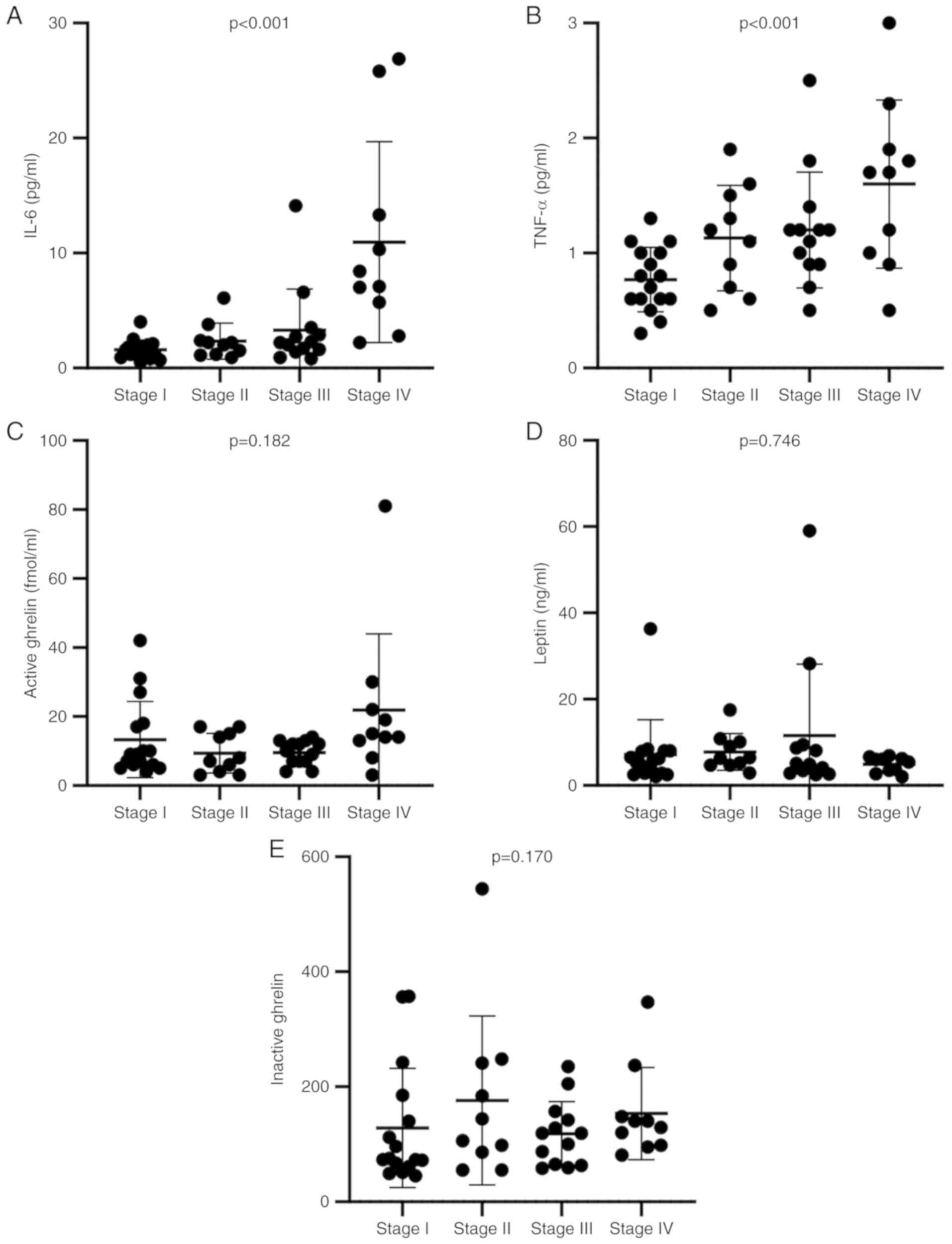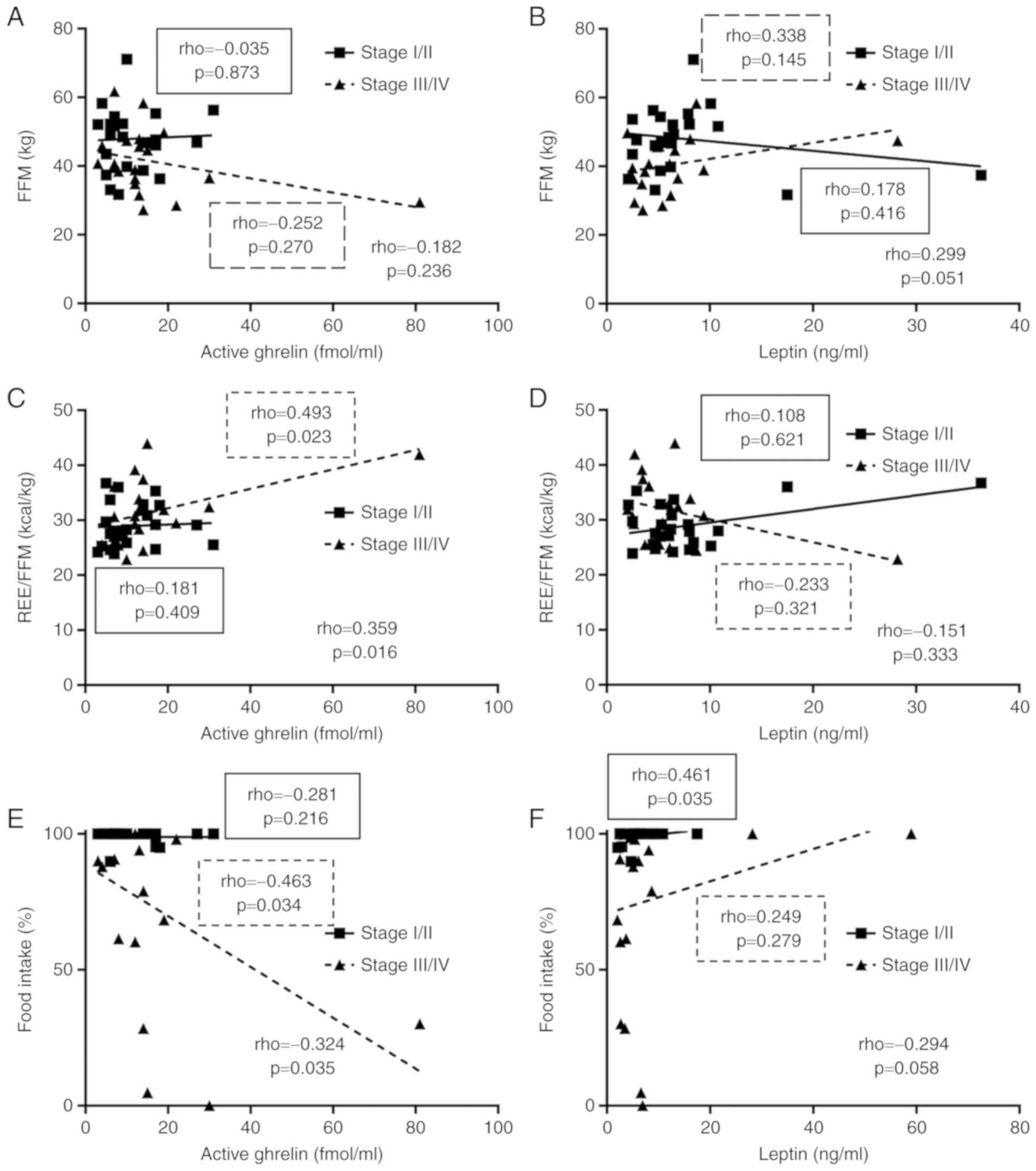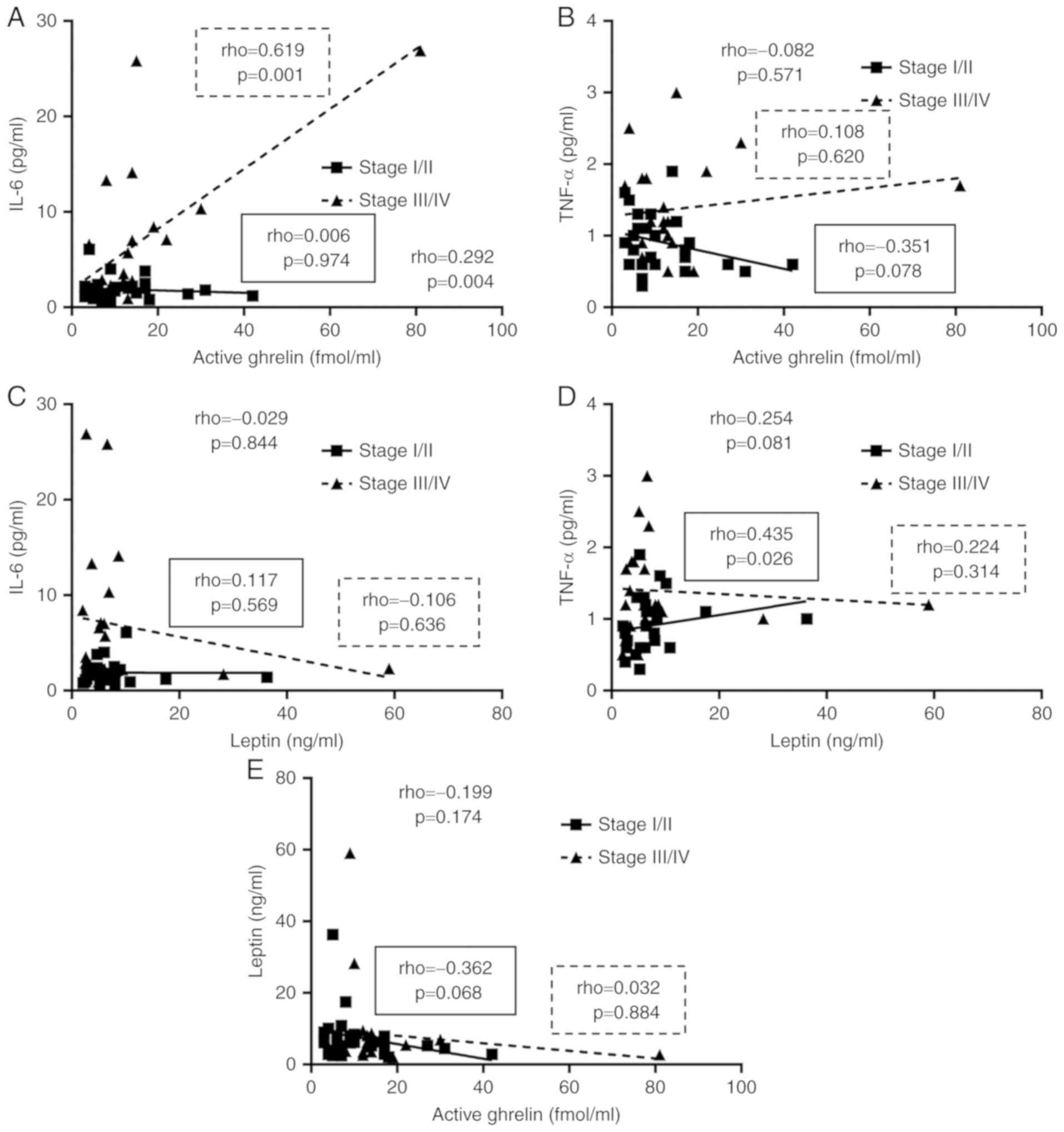|
1
|
Arends J, Baracos V, Bertz H, Bozzetti F,
Calder PC, Deutz NEP, Erickson N, Laviano A, Lisanti MP, Lobo DN,
et al: ESPEN expert group recommendations for action against
cancer-related malnutrition. Clin Nutr. 36:1187–1196. 2017.
View Article : Google Scholar : PubMed/NCBI
|
|
2
|
Zhang L, Lu Y and Fang Y: Nutritional
status and related factors of patients with advanced
gastrointestinal cancer. Br J Nutr. 111:1239–1244. 2014. View Article : Google Scholar : PubMed/NCBI
|
|
3
|
Grivennikov SI and Karin M: Inflammatory
cytokines in cancer: Tumour necrosis factor and interleukin 6 take
the stage. Ann Rheum Dis. 70 (Suppl 1):i104–i108. 2011. View Article : Google Scholar : PubMed/NCBI
|
|
4
|
Ashizawa T, Okada R, Suzuki Y, Takagi M,
Yamazaki T, Sumi T and Aoki T, Ohnuma S and Aoki T: Clinical
significance of interleukin-6 (IL-6) in the spread of gastric
cancer: Role of IL-6 as a prognostic factor. Gastric Cancer.
8:124–131. 2005. View Article : Google Scholar : PubMed/NCBI
|
|
5
|
Guthrie GJ, Roxburgh CS, Horgan PG and
McMillan DC: Does interleukin-6 link explain the link between
tumour necrosis, local and systemic inflammatory responses and
outcome in patients with colorectal cancer? Cancer Treat Rev.
39:89–96. 2013. View Article : Google Scholar : PubMed/NCBI
|
|
6
|
Shimazaki J, Goto Y, Nishida K, Tabuchi T,
Motohashi G and Ubukata H: In patients with colorectal cancer,
preoperative serum interleukin-6 level and granulocyte/lymphocyte
ratio are clinically relevant biomarkers of long-term cancer
progression. Oncology. 84:356–361. 2013. View Article : Google Scholar : PubMed/NCBI
|
|
7
|
Ma Y, Ren Y, Dai ZJ, Wu CJ, Ji YH and Xu
J: IL-6, IL-8 and TNF-α levels correlate with disease stage in
breast cancer patients. Adv Clin Exp Med. 26:421–426. 2017.
View Article : Google Scholar : PubMed/NCBI
|
|
8
|
Fearon K, Strasser F, Anker SD, Bosaeus I,
Bruera E, Fainsinger RL, Jatoi A, Loprinzi C, MacDonald N,
Mantovani G, et al: Definition and classification of cancer
cachexia: An international consensus. Lancet Oncol. 12:489–495.
2011. View Article : Google Scholar : PubMed/NCBI
|
|
9
|
Braun TP and Marks DL: Pathophysiology and
treatment of inflammatory anorexia in chronic disease. J Cachexia
Sarcopenia Muscle. 1:135–145. 2010. View Article : Google Scholar : PubMed/NCBI
|
|
10
|
Li YP and Reid MB: NF-kappaB mediates the
protein loss induced by TNF-alpha in differentiated skeletal muscle
myotubes. Am J Physiol Regul Integr Comp Physiol. 279:R1165–R1170.
2000. View Article : Google Scholar : PubMed/NCBI
|
|
11
|
Kojima M, Hosoda H, Date Y, Nakazato M,
Matsuo H and Kangawa K: Ghrelin is a growth-hormone-releasing
acylated peptide from stomach. Nature. 402:656–660. 1999.
View Article : Google Scholar : PubMed/NCBI
|
|
12
|
Mihalache L, Gherasim A, Nita O, Ungureanu
MC, Pădureanu SS, Gavril RS and Arhire LI: Effects of ghrelin in
energy balance and body weight homeostasis. Hormones (Athens).
15:186–196. 2016. View Article : Google Scholar : PubMed/NCBI
|
|
13
|
Cui H, Lopez M and Rahmouni K: The
cellular and molecular bases of leptin and ghrelin resistance in
obesity. Nat Rev Endocrinol. 13:338–351. 2017. View Article : Google Scholar : PubMed/NCBI
|
|
14
|
Kirchner H, Gutierrez JA, Solenberg PJ,
Pfluger PT, Czyzyk TA, Willency JA, Schürmann A, Joost HG, Jandacek
RJ, Hale JE, et al: GOAT links dietary lipids with the endocrine
control of energy balance. Nat Med. 15:741–745. 2009. View Article : Google Scholar : PubMed/NCBI
|
|
15
|
Suzuki H, Asakawa A, Amitani H, Nakamura N
and Inui A: Cancer cachexia-pathophysiology and management. J
Gastroenterol. 48:574–594. 2013. View Article : Google Scholar : PubMed/NCBI
|
|
16
|
Nakazato M, Murakami N, Date Y, Kojima M,
Matsuo H, Kangawa K and Matsukura S: A role for ghrelin in the
central regulation of feeding. Nature. 409:194–198. 2001.
View Article : Google Scholar : PubMed/NCBI
|
|
17
|
Shimizu Y, Nagaya N, Isobe T, Imazu M,
Okumura H, Hosoda H, Kojima M, Kangawa K and Kohno N: Increased
plasma ghrelin level in lung cancer cachexia. Clin Cancer Res.
9:774–778. 2003.PubMed/NCBI
|
|
18
|
Wolf I, Sadetzki S, Kanety H, Kundel Y,
Pariente C, Epstein N, Oberman B, Catane R, Kaufman B and Shimon I:
Adiponectin, ghrelin, and leptin in cancer cachexia in breast and
colon cancer patients. Cancer. 106:966–973. 2006. View Article : Google Scholar : PubMed/NCBI
|
|
19
|
Kerem M, Ferahkose Z, Yilmaz UT, Pasaoglu
H, Ofluoglu E, Bedirli A, Salman B, Sahin TT and Akin M: Adipokines
and ghrelin in gastric cancer cachexia. World J Gastroenterol.
14:3633–3641. 2008. View Article : Google Scholar : PubMed/NCBI
|
|
20
|
Garcia JM, Garcia-Touza M, Hijazi RA,
Taffet G, Epner D, Mann D, Smith RG, Cunningham GR and Marcelli M:
Active ghrelin levels and active to total ghrelin ratio in
cancer-induced cachexia. J Clin Endocrinol Metab. 90:2920–2926.
2005. View Article : Google Scholar : PubMed/NCBI
|
|
21
|
Nagaya N, Uematsu M, Kojima M, Date Y,
Nakazato M, Okumura H, Hosoda H, Shimizu W, Yamagishi M, Oya H, et
al: Elevated circulating level of ghrelin in cachexia associated
with chronic heart failure: Relationships between ghrelin and
anabolic/catabolic factors. Circulation. 104:2034–2038. 2001.
View Article : Google Scholar : PubMed/NCBI
|
|
22
|
Baker JP, Detsky AS, Wesson DE, Wolman SL,
Stewart S, Whitewell J, Langer B and Jeejeebhoy KN: Nutritional
assessment: A comparison of clinical judgement and objective
measurements. N Engl J Med. 306:969–972. 1982. View Article : Google Scholar : PubMed/NCBI
|
|
23
|
Isenring EA, Capra S and Bauer JD:
Nutrition intervention is beneficial in oncology outpatients
receiving radiotherapy to the gastrointestinal or head and neck
area. Br J Cancer. 91:447–452. 2004. View Article : Google Scholar : PubMed/NCBI
|
|
24
|
Bauer J, Capra S and Ferguson M: Use of
the scored Patient-Generated Subjective Global Assessment (PG-SGA)
as a nutrition assessment tool in patients with cancer. Eur J Clin
Nutr. 56:779–785. 2002. View Article : Google Scholar : PubMed/NCBI
|
|
25
|
Dempsey DT, Feurer ID, Knox LS, Crosby LO,
Buzby GP and Mullen JL: Energy expenditure in malnourished
gastrointestinal cancer patients. Cancer. 53:1265–1273. 1984.
View Article : Google Scholar : PubMed/NCBI
|
|
26
|
Hansell DT, Davies JW and Burns HJ: The
relationship between resting energy expenditure and weight loss in
benign and malignant disease. Ann Surg. 203:240–245. 1986.
View Article : Google Scholar : PubMed/NCBI
|
|
27
|
Bosaeus I, Daneryd P, Svanberg E and
Lundholm K: Dietary intake and resting energy expenditure in
relation to weight loss in unselected cancer patients. Int J
Cancer. 93:380–383. 2001. View
Article : Google Scholar : PubMed/NCBI
|
|
28
|
Moses AW, Slater C, Preston T, Barber MD
and Fearon KC: Reduced total energy expenditure and physical
activity in cachectic patients with pancreatic cancer can be
modulated by an energy and protein dense oral supplement enriched
with n-3 fatty acids. Br J Cancer. 90:996–1002. 2004. View Article : Google Scholar : PubMed/NCBI
|
|
29
|
Staal-van den Brekel AJ, Schols AM, ten
Velde GP, Buurman WA and Wouters EF: Analysis of the energy balance
in lung cancer patients. Cancer Res. 54:6430–6433. 1994.PubMed/NCBI
|
|
30
|
Falconer JS, Fearon KC, Plester CE, Ross
JA and Carter DC: Cytokines, the acute-phase response, and resting
energy expenditure in cachectic patients with pancreatic cancer.
Ann Surg. 219:325–331. 1994. View Article : Google Scholar : PubMed/NCBI
|
|
31
|
Omagari K, Iwami H, Kaji M, Ishii Y,
Matsutake S, Ichimura M, Kato S, Takeshhita, Ichikawa T and Nakao
K: The relationship between energy expenditure and type or stage of
cancer. Acta Medica Nagasakiensia. 57:33–40. 2012.
|
|
32
|
Moriwaki H, Aoyagi S, Ishizuka Y, et al:
Japanese Anthropometric Reference Data 2001. JARD 2001. Jpn Nutr
Assess. 19:45–81. 2002.
|
|
33
|
Harris JA and Benedict FG: A biometric
study of human basal metabolism. Proc Natl Acad Sci USA. 4:370–373.
1918. View Article : Google Scholar : PubMed/NCBI
|
|
34
|
Weir JB: New methods for calculating
metabolic rate with special reference to protein metabolism. J
Physiol. 109:1–9. 1949. View Article : Google Scholar : PubMed/NCBI
|
|
35
|
Sasaki M, Johtatsu T, Kurihara M, Iwakawa
H, Tanaka T, Bamba S, Tsujikawa T, Fujiyama Y and Andoh A: Energy
expenditure in Japanese patients with severe or moderate ulcerative
colitis. J Clin Biochem Nutr. 47:32–36. 2010. View Article : Google Scholar : PubMed/NCBI
|
|
36
|
Sasaki M, Okamoto H, Johtatsu T, Kurihara
M, Iwakawa H, Tanaka T, Shiomi H, Naka S, Kurumi Y and Tani T:
Resting energy expenditure in patients undergoing pylorus
preserving pancreatoduodenectomies for bile duct cancer or
pancreatic tumors. J Clin Biochem Nutr. 48:183–186. 2011.
View Article : Google Scholar : PubMed/NCBI
|
|
37
|
Takaoka A, Sasaki M, Nakanishi N, Kurihara
M, Ohi A, Bamba S and Andoh A: Nutritional screening and clinical
outcome in hospitalized patients with crohn's disease. Ann Nutr
Metab. 71:266–272. 2017. View Article : Google Scholar : PubMed/NCBI
|
|
38
|
Zhang Y, Proenca R, Maffei M, Barone M,
Leopold L and Friedman JM: Positional cloning of the mouse obese
gene and its human homologue. Nature. 372:425–432. 1994. View Article : Google Scholar : PubMed/NCBI
|
|
39
|
Satoh N, Ogawa Y, Katsuura G, Tsuji T,
Masuzaki H, Hiraoka J, Okazaki T, Tamaki M, Hayase M, Yoshimasa Y,
et al: Pathophysiological significance of the obese gene product,
leptin, in ventromedial hypothalamus (VMH)-lesioned rats: Evidence
for loss of its satiety effect in VMH-lesioned rats. Endocrinology.
138:947–954. 1997. View Article : Google Scholar : PubMed/NCBI
|



















